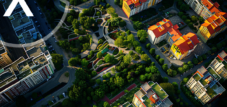Published on: June 4, 2025 / update from: June 4, 2025 - Author: Konrad Wolfenstein

Smart City and Urbanos of Datamatters: Germany's first municipal operating system reaches 25 connected cities - Image: Xpert.digital
How Urbano's German cities Smarter networked
The first municipal operating system: Urbanos sets standards
The Cologne start-up Datmatters has reached an important milestone in the German smart city landscape with Urbanos. According to the presentation of the world's first municipal operating system in May 2025, more than 25 German cities are already connected to the innovative platform via sensor networks. The system is based on a multi -stage approach from sensors, municipal data space and artificial intelligence, which for the first time enables municipalities a minute -up overview of urban processes and even creates future forecasts. The rapid adoption shows the great interest of German municipalities in data -driven solutions for urban challenges, whereby many projects are still in the early test stage and therefore not all participating cities want to be named.
Suitable for:
- Smart City Logistics: Innovative concepts for traffic and city logistics – distribution of goods and supply chains in the city
Technical architecture and functionality of urbanos
Multi -stage system design
The Urbanos system is based on a sophisticated multi-layer model that combines five central components: sensors, local data space, artificial intelligence, data-based decision-making and optimized services for citizenship and administration. Dr. Daniel Trauth, company founder and managing director of Datamatters GmbH, describes the functional principle as a continuous data cycle: “A wide range of sensors is recorded in the city. This information is transferred to a municipal data space and processed there using AI.”
The data recorded is then visualized in a central urban pit, which for the first time offers decision -makers a minute -up overview of the actual processes in your city. The system works in a similar way to an aircraft cockpit in which a pilot receives all the relevant information about controlling its vehicle. The technical infrastructure supports various connectivity standards such as Lorawan, NB-IoT and mobile phone networks to ensure seamless integration of different sensor technologies.
AI-based forecast and decision making
A special feature of Urbanos lies in its prognostic ability through artificial intelligence. The AI not only analyzes current data, but also creates detailed predictions about future developments in the city. These future forecasts are also presented in the urbancockpit and municipalities provide an unprecedented data basis for urban decisions. Dr. Trauth illustrates the practical application with a concrete example: "Cameras in buses and trains can precisely record how many seats are occupied". This information makes it possible to optimize traffic capacities in real time and predict future needs.
The system already supports all common AI models and IT systems, so that existing municipal infrastructures can be seamlessly docked at the operating system. This compatibility makes integration considerably facilitating and reduces the technical hurdles for interested municipalities. The AI component continuously works in the background and learns from the incoming data streams in order to constantly improve the accuracy of their forecasts.
App store concept for municipal services
Similar to modern smartphone operating systems, Urbanos has an integrated app store that makes the system particularly flexible and expandable. Municipal pension companies and private sector companies can offer their services in this Urbanos app store so that service providers can claim them for a fee. This structure creates a digital ecosystem in which various providers can provide their specialized solutions for urban challenges.
Current distribution and participating cities
Rapid expansion since launch
The response to Urbanos clearly exceeds the expectations of the developers. Since the official presentation in early May 2025, more than 25 German cities have been connected to the system via sensor networks. Dr. Daniel Trauth is enthusiastic about the demand: "The demand is huge, although there are still many projects in an early test stage". This fast adoption indicates a high need for German municipalities after innovative smart city solutions.
The cities mentioned by name include important municipalities of various sizes: Aachen, Auweiler, Bad Honnef, Coesfeld, Dormagen, Dülmen, Essen, Euskirchen, Frechen, Grevenbroich, Heiligenstedt, Hürth, Krefeld, Leverkusen, Lüdinghausen, Mönchengladbach, Munich, Nuremberg, Siegen, Singen, Solingen, St. Augustin, Weinheim, Widdersdorf and Willich. This geographical distribution shows that urbanos are interesting for large cities such as Munich and Essen as well as for smaller municipalities.
Scalability of small to large cities
The “digital community center” Urbanos is designed highly and covers the requirements of various administrative levels - from small municipalities to medium -sized cities to millions. This flexibility makes the system equally attractive for cities, districts and counties. The platform can be adapted to the specific needs and resources of the respective municipality without the need for basic system changes.
Already established implementations show the practical applicability of the system. Dormagen, Hürth, Dülmen, Senden, Lüdinghausen and Nordkirchen are listed as active users on the Urbanos website. These cities serve as reference projects and demonstrate various application scenarios of the system in real municipal environments.
Areas of application and practical implementation
Optimization of waste management
A prominent application example of Urbanos can be found in the area of intelligent waste management. The system has already been successfully implemented in the city of Hürth, where smart trash can be equipped with sensors. These sensors continuously record the level of the containers and transmit the data to the central platform. The AI-based evaluation enables optimized route planning for garbage vehicles, which leads to demonstrable CO₂ savings and efficiency increases in urban waste disposal.
The practical implementation shows an example of how Urbanos can optimize complex urban processes. Instead of working according to fixed schedules, waste disposal companies can now act in a need -controlled manner and only empty containers if they are actually full. This not only reduces environmental impact on unnecessary journeys, but also significantly reduces the operational costs for the municipalities.
Traffic control and public security
The system is suitable for optimizing a wide range of urban infrastructures, from traffic routing to energy supply to public security. By integrating traffic sensors, traffic lights can be adapted to the actual traffic volume in real time. Energy management modules enable intelligent control of urban lighting and other energy-intensive infrastructures.
In the area of public security, various sensors can provide data via noise levels, air quality or passenger flows. This information helps authorities to recognize potential problem situations at an early stage and take preventive measures. The forecasting skills of the AI also make it possible to identify trends and patterns that are relevant for long -term urban planning.
Economic aspects and pilot programs
Cost efficiency and financing models
A decisive advantage of urbanos lies in its cost efficiency, which is particularly important in times of scarce municipal households. The system not only promises improved services for citizens, but also reduced administrative costs and optimized use of resources. The data -driven optimization of urban processes can lead to significant savings, since resources are used more targeted and waste is avoided.
The company offers various package solutions that range from a free starter package to comprehensive district solutions. A nine -month pilot program is available for interested municipalities, which enables the system to test the system without risk. During this test phase, cities are given limited access to the functionalities and can evaluate the advantages of the system in practice.
Community edition and entry opportunities
For initial tests and smaller applications, Datamatts offers a community edition that enables immediate access to a Lorawan name server and 5,000 free credits. This low -threshold entry option allows municipalities to gain initial experience with the platform without a credit card or long -term obligations. Sensors can be connected immediately via roaming gateways and data can be received, which enables quick implementation.
The staggered price structure also makes Urbanos accessible to smaller municipalities with limited IT budgets. At the same time, larger cities can benefit from more extensive packages that offer extended functionalities and higher data volume. This flexibility contributes to the broad acceptance of the system at various municipal sizes.
Suitable for:
- Smart City, Factory, Logistics and Industrial Metaverse: It's actually already here, the puzzle pieces just need to be brought together
Future prospects and further development
Nationwide scaling and market potential
The successful implementation in 25 cities shows the considerable market potential of urbanos in Germany. The system addresses central challenges of German municipalities such as demographic change, climate protection, digitization and cost optimization. With the progressive digitization of public administration and increasing demands on sustainable urban development, the demand for such integrated smart city solutions is likely to increase.
The fact that many other municipalities show interest but not yet want to be mentioned publicly indicates an even greater potential. Dr. Trauth sees Urbanos as a “digital community center for Smart Cities”, which is already tested in several cities. This vision of a comprehensive digital ecosystem for municipal services could revolutionize the way cities manage their infrastructures and provide civil services.
Technological development and integration
The continuous further development of AI components and the integration of new sensor technologies will make urbanos even more efficient. The platform is designed to grow with new technological developments and to support various IoT standards. This ensures future security for investing municipalities and enables technological advances to benefit without having to replace the entire system.
Data -driven cities: Urbanos as the key to the modern city
The development of urbanos through Datamatters marks an important milestone in the German smart city landscape. With 25 connected cities and rapidly growing demand, the system has established itself as a practical solution for municipal digitization challenges. The combination of sensor technology, AI-based data evaluation and prognostic skills offers municipalities the opportunity for the first time to act data-driven and foresight.
The multi-stage architecture concept with its app store approach creates a flexible ecosystem that can be scalable for both small communities and cities. The successful implementations in areas such as intelligent waste management demonstrate concrete advantages in the form of cost savings and environmental protection. The availability of various pilot programs and entry options significantly lowers the inhibition threshold for interested municipalities.
For the future of German smart city development, Urbanos could play a catalysis royal role by showing how integrated technological solutions can address local challenges. The continuous expansion and the persistent interest of other cities believe that the system will make a sustainable contribution to the modernization of the German local government.
Suitable for:
Your global marketing and business development partner
☑️ Our business language is English or German
☑️ NEW: Correspondence in your national language!
I would be happy to serve you and my team as a personal advisor.
You can contact me by filling out the contact form or simply call me on +49 89 89 674 804 (Munich) . My email address is: wolfenstein ∂ xpert.digital
I'm looking forward to our joint project.













